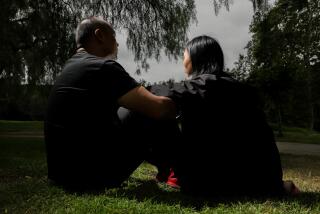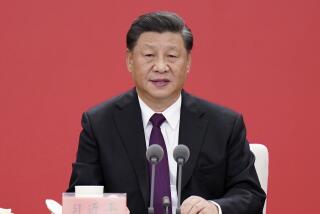Chinese Letters : Beijing’s ‘Ann Landers’ Continues Column While Visiting Alhambra
- Share via
“Qiu Ming Big Sister,” the letter from a young woman began. “I’m a farm girl. Although I’m of marrying age, I don’t want to get married. I don’t love him. We have nothing in common. I want to call the wedding off, but my parents will not permit that.”
This letter from a woman in China’s Jiangsu Province was sent to Qiu Ming, the “Ann Landers” of China. Qiu, a journalist from Beijing who is living in Alhambra during a six-month visit to the United States, has not forsaken her readers while she is out of the country.
Like clockwork, her weekly advice column continues to appear every Friday in the China Woman’s Daily, offering words of comfort that Qiu mails from Alhambra. About every two weeks, her editors forward another packet of selected letters to Qiu.
Her advice, which reaches 300,000 subscribers in China, is often the only emotional outlet for some of her correspondents, Qiu said. The letter writers seek advice about everything from extramarital affairs to loneliness.
“When Chinese women face a personal difficulty, there is no one to help,” said Qiu, who started her column 18 months ago. “I want to be that sympathetic ear.”
Qiu, 42, came to Southern California in February as part of a cultural exchange program at the invitation of the Chinese Culture Renaissance Assn., a nonprofit Alhambra group that promotes appreciation of Chinese literature and performing arts.
In between seminars and other speaking engagements, Qiu has found time to continue her column as well as write articles recording her impressions of the United States.
Recently, in the aftermath of the bloody military crackdown in Beijing, Qiu also volunteered to help publish the Press Freedom Herald, a newspaper compiled by Chinese journalists here who oppose censorship in China.
The most recent packet of letters from her editors was postmarked May 29, six days before the killing began at Tian An Men Square and six weeks after the pro-Democracy movement began in Beijing. But none of the letters mentioned the protest that, at its height, drew more than a million people.
Qiu believes that some of the recent letters from readers must have focused on the protests but suspects that her editors chose not to forward those.
“If there are some of those letters, I think they will throw them away to protect me,” Qiu said.
As have all the journalists, Qiu has taken a chance by helping to publish the Herald. Her parents and 13-year-old daughter live in Beijing, and she shares the concern of other Chinese here who support pro-democracy protesters that there may be repercussions for her family. But she is optimistic that no harm will come to her family.
“If I thought that to do this I have to sacrifice my daughter, I wouldn’t have done it,” Qiu said.
Each night, Qiu reads the pile of letters from China and writes individual replies to almost all of those who seek her help. For women whose letters will not be published in the newspaper, she sends a handwritten response that often runs several pages.
In Beijing, Qiu managed with just four hours of sleep each night, getting up at 2 a.m. to write to her readers and work on magazine articles and short stories. She also has a full-time job as an associate editor for the Great Wall Literary Magazine.
Qiu doesn’t have to personally answer each letter, but she wants to.
“What the letter writer needs the most is to hear from me,” Qiu said. “They feel someone is listening, helping them.”
More to Read
Sign up for Essential California
The most important California stories and recommendations in your inbox every morning.
You may occasionally receive promotional content from the Los Angeles Times.













